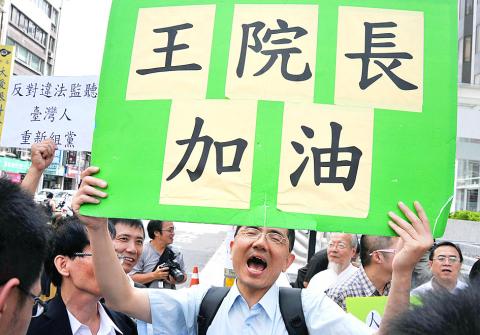|
Wang ‘sad’ over KMT’s decision, aims
to repeal it
By Shih Hsiu-chuan / Staff reporter

Supporters of Legislative Speaker
Wang Jin-pyng chant slogans and hold signs outside the Chinese Nationalist
Party’s (KMT) Taipei headquarters yesterday.
Photo: Mandy Cheng / AFP
Branding himself a Chinese Nationalist
Party (KMT) member “forever and ever,” Legislative Speaker Wang Jin-pyng (王金平)
yesterday took legal action as he sought to invalidate a party ruling that
revoked his membership.
The 72-year-old Wang, who has served as a lawmaker since he was 34, said he was
“sad” about the decision because the KMT was like a “mother” to him, but added
that he was facing the situation “calmly.”
Wang, a KMT legislator-at-large, has vowed to appeal to retain his membership,
which, if revoked, will force him to forfeit his post as a lawmaker.
The KMT’s Central Evaluation and Discipline Committee yesterday withdrew Wang’s
membership over his alleged involvement in illegally lobbying on behalf of
Democratic Progressive Party (DPP) legislative caucus whip Ker Chien-ming (柯建銘)
in a legal case.
Wang denies any wrongdoing.
A few hours after the decision was made, the committee promptly delivered the
document to the Central Election Commission (CEC) in order to invoke the
necessary procedures to nullify Wang’s membership.
After receiving the notice, the election commission sent a letter to the
legislature, as required by Article 73 of the Civil Servants Election and Recall
Act (公職人員選舉罷免法), in the evening to ask it to revoke Wang’s status as a lawmaker,
CEC Vice Chairman Liu I-chou (劉義周) said.
The act does not specify how long the legislature will take to complete the
procedure, but the CEC said it would name a KMT legislator-at-large to replace
Wang within 15 days of receiving the legislature’s reply, Liu said.
Wang yesterday offered an apology to the public, saying he was sorry that former
minister of justice Tseng Yung-fu (曾勇夫) resigned over the incident and for the
disturbances caused to society.
However, he also acted quickly to defend his standing in the party.
Former DPP lawmaker and attorney Chiu Tai-san (邱太三) filed an injunction against
the revocation with the Taipei District Court, as well as a civil lawsuit
seeking to overrule the KMT’s decision.
Chiu said that submitting an appeal to the KMT alone was not sufficient to
prevent the party from rescinding Wang’s membership and suggested that the
legislative speaker seek other judicial means to avoid irreparably damaging his
legal rights.
Wang said he was considering bringing another civil lawsuit against the KMT to
reverse his expulsion.
Chiu said that former KMT lawmaker Hsu Shu-po (許舒博), who was expelled by the
party because of his involvement in a legal case, had filed an injunction
against the party and had his membership reinstated in 2011.
The decision to expel Wang has aroused anger among several KMT members.
In Greater Kaohsiung, Wang’s hometown, 11 KMT borough wardens withdrew from the
party to voice their discontent with his ejection.
KMT Legislator Chen Ken-te (陳根德) said the party was doomed to fail in future
elections because by expelling Wang — who is favored by KMT pro-localization
factions — it had shown that President Ma Ying-jeou (馬英九) was eager to distance
the party from pro-localization forces.
Former Taipei EasyCard Corp (悠遊卡公司) chairman Sean Lien (連勝文), the eldest son of
former KMT chairman Lien Chan (連戰), paid a visit to Wang in his legislative
office, saying that whether the speaker was guilty in the influence-peddling
case should be decided by a court, not a handful of people — an apparent
reference to the KMT disciplinary committee.
“We are living in the 102th year of the Republic of China, not in the Ming
Dynasty. No one in the country is above the law,” Sean Lien said.
His comments appeared to be a reference to a Ming-era intelligence unit known as
Dong Chang (東廠), which had the power to spy on court officials, the gentry,
academics and the army, and reported directly to the emperor. The unit could
also arrest and interrogate such people if authorized to do so by the emperor.
Additional reporting by Jake Chung
|
![]()
![]()
![]()